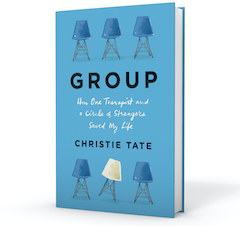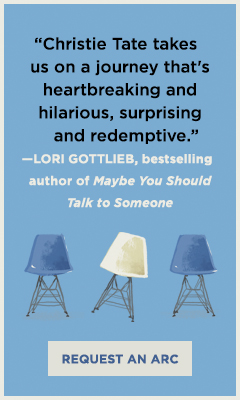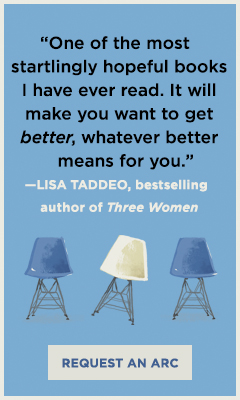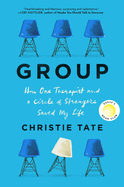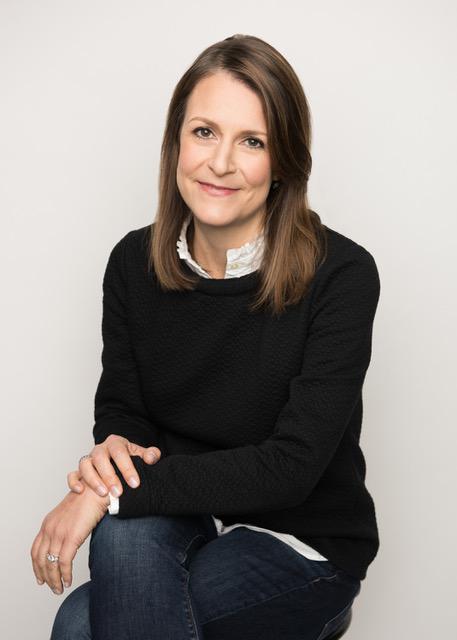Group: How One Therapist and a Circle of Strangers Saved My Life
by Christie Tate
In her memoir, Group: How One Therapist and a Circle of Strangers Saved My Life, Christie Tate gets real--and real honest--about her experience in group therapy, and all the things it taught her about herself and her life.
At the age of 27, Tate was on the rise. She had overcome an eating disorder, was working the 12 steps of her program, had a good job and was set to graduate at the top of her law school class. She was also deeply, deeply unhappy, and felt not only temporarily isolated and alone in her life, but as though she was entirely incapable of connecting with other people. "I sensed in my gut that I didn't know how to stay connected, how not to be cast aside." She wanted a meaningful and serious relationship. She wanted answers. She wanted, perhaps more than anything, to know what she wanted.
Enter Dr. Rosen, a therapist whom Tate herself calls "wacky" and whose methods seem, to anyone with even a passing familiarity with individual and/or group therapy, more than a little unorthodox. There is no confidentiality required in Rosen's groups, no promise that secrets shared there will stay there. It is in fact quite the opposite; sharing of secrets is not only welcomed, but encouraged. "[Confidentiality] might be standard practice," Dr. Rosen explains to Tate, "but keeping secrets for other people is more toxic than other people knowing your business. Holding on to secrets is a way to hold shame that doesn't belong to you." He assigns equally nontraditional "prescriptions" to patients in his groups; Tate, for example, is told to call a fellow groupmate to discuss what she ate for dinner, and to ask for nightly affirmations. Another groupmate is told to play his guitar in front of the group; a third to rub strawberries on her husband's stomach. "Wacky," it turns out, may be a bit of an understatement when applied to Dr. Rosen, and Tate joins his groups with no small amount of trepidation. "What am I going to get out of this?" she asks herself, not realizing then that this question would become "part mantra, part catch phrase."
There's something lurking beneath the surface of this therapy, which may look unfamiliar but proves appealing in its ability to give both its participants--and, by extension, readers of Group--a space to both think and feel and be in company with others without judgment or fear of rejections. Stories of Tate's own lived experiences--first discovering masturbation as a child, witnessing a drowning as a teen, recollections of unhealthy (and borderline abusive) relationships--combine with reminiscences from her groupmates to give readers an almost voyeuristic look into the deep, internal work that comprises therapy. But that is not to suggest that Group is mere tell-all, laying forth secrets for all the world to read. It is both that and an account of how that telling of all allowed one woman to become fully and completely herself, related with a sense of candor and honesty that is rare in memoirs.
Woven throughout Group is the idea of what it means to both have and be a witness to other people's most hidden depths. What does it mean to stop pretending, stop masking, stop acting like the person expected, and instead merely be one's absolute and truest self? In the early pages of Tate's memoir, neither Tate nor her readers are entirely sure. "I used fake smiles, 'I'm fines,' and gigantic binges like other people used Kleenex," she recalls.
Tate's background as an essayist (her writing has appeared in the New York Times, the Washington Post and many other print and online publications) shapes the rhythm and movement of her memoir; as she moves away from this "fabricated version" of herself, her recollections of her experiences move deftly between personal anecdote and larger reckonings to offer readers not just an exposé but an invitation. She herself learns the value of having witnesses to her every feeling and darkest secrets: not immediate answers, as she had hoped for, but a path to community and human connection. By sharing her story--and, yes, her secrets--in Group, she is inviting us each to remember that we, too, have the tools within ourselves to foster that same human connection, no matter how impossible it may seem at times. Sharp and insightful, told with a warmth and honesty that will make Tate feel as much like a friend as a writer, Group is a memoir that proves a valuable and refreshing addition to the annals of mental health conversations. --Kerry McHugh



